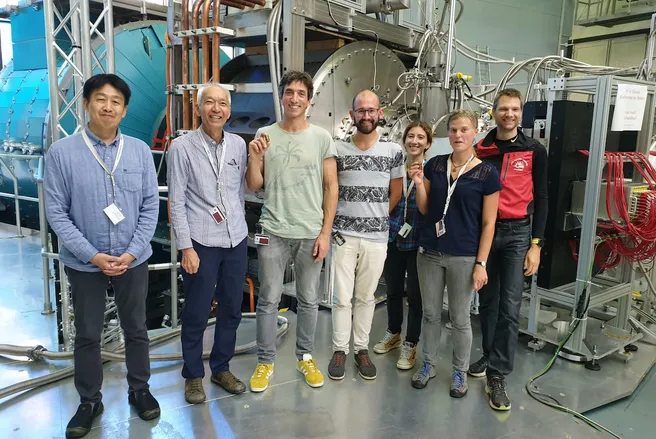Prof. Ellen Fogh joined the Department of Physics in the School of Natural Sciences in March 2025. She comes to TUM from École Polytechnique Fédérale de Lausanne (Switzerland), where she was a postdoctoral researcher in the Laboratory for Quantum Magnetism.
Fogh works in the field of experimental condensed matter physics, focusing on magnetism. With a strong background in using neutron scattering experiments in combination with magnetic fields and pressures, she investigates how magnetic moments (spins) interact in a material. The more we know about the collective behavior of such systems, the better equipped we are to tackle challenges in quantum technology, with potential applications in low-power-consumption devices, sensors and data storage.
In two recent papers published in Review of Scientific Instruments and Physical Review Letters, Fogh and co-authors used high pressure in ultra-challenging neutron scattering experiments at the Berlin Experimental Reactor (BER-II), Helmholtz Center Berlin for Materials and Energy and at the Institute Laue-Langevin (ILL), Grenoble. In Berlin, they developed a special pressure cell to be used in combination with a horizontal high-field magnet to study material responses to the two extremes. This innovative design ensures uniform and minimal neutron absorption by smart material choices and optimal shape.
In Grenoble, they used an already existing pressure cell to study spin excitations of the quantum magnet, SrCu2(BO3)2, in its high-pressure antiferromagnetic phase for the first time. The challenge here was the very small sample size resulting in weak signals, but strategic data collection and instrument optimization ensured a successful outcome. Subsequent modelling of the data showed that out-of-plane interactions play a more significant role than expected in this compound. This result has consequences for the associated predictions of other phases and critical points. SrCu2(BO3)2 is a very important material in the field of many-body quantum physics because it is a physical realisation of model which can be solved exactly. Being able to test the model in the real world enables theoreticians to refine and develop their tools and to gain a better understanding of quantum mechanical phenomena.
The expertise required to perform such neutron scattering experiments in extreme conditions at BER II and ILL will now be applied to her work with Forschungs-Neutronenquelle Heinz Maier-Leibnitz (FRM II) research center right here in Garching.
Publications
- Ellen Fogh, Gaétan Giriat, et al. Bullet pressure-cell design for neutron scattering experiments with horizontal magnetic fields and dilution temperatures, Review of Scientific Instruments, https://doi.org/10.1063/5.0250156
- Ellen Fogh, Gaétan Giriat, et al. Spin Waves and Three Dimensionality in the High-Pressure Antiferromagnetic Phase of SrCu2(BO3)2, Physical Review Letters, https://doi.org/10.1103/PhysRevLett.133.246702
More information and links
- TUM-wide research goal Quantum Technologies https://www.tum.de/en/research/research-goals/digitalization-ai-and-quantum-technologies/quantum-technologies
- TUM School of Natural Sciences research area Quantum Science & Technologies https://www.nat.tum.de/en/nat/research/main-research-areas/quantum-science-technologies/
- More information about Fogh’s work with the Helmholtz Center Berlin, “Neutron experiment at BER II reveals new spin phase in quantum materials” https://www.helmholtz-berlin.de/pubbin/news_seite?nid=26386&sprache=en
Contact about the research articles
Prof. Ellen Fogh
Technical University of Munich
TUM School of Natural Sciences
Professor for Quantum Magnetism
ellen.fogh@tum.de
https://www.ph.nat.tum.de/en/ph/about/profs/ellen-fogh/
Press contact
